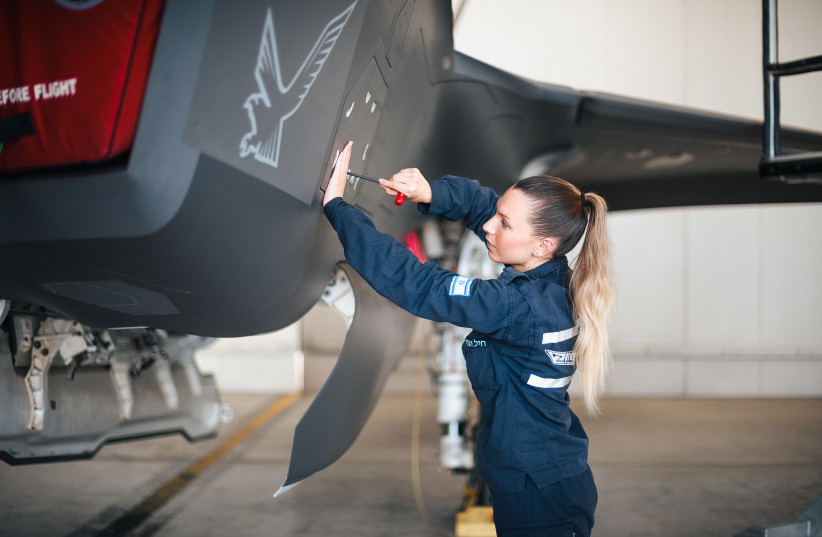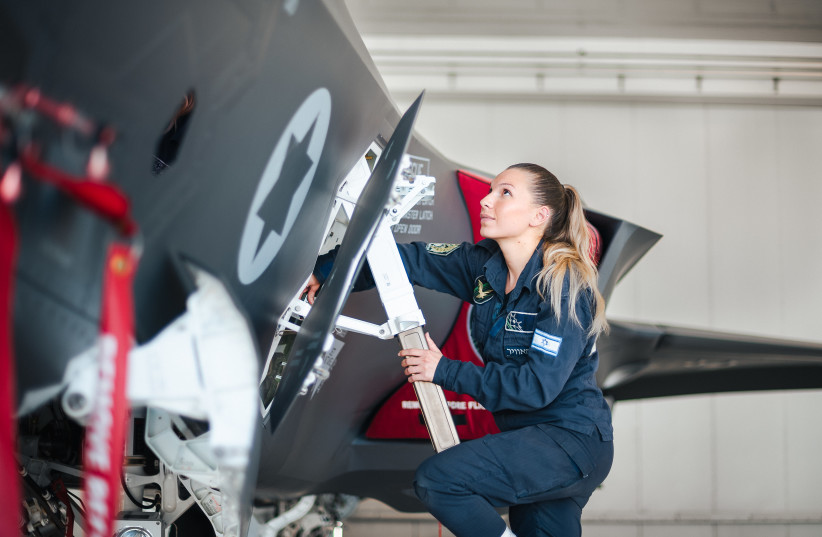Lauren Friedman, 23, is an orthodox Jew, a wife, a student, and an emergency medical technician (EMT) for American Medical Response. She is also an IDF reservist who works as a technician on Israel’s F-35 fighter jets.
“The air force, especially currently, is really the backbone [of the IDF],” Friedman said. She details that it plays a crucial role in both gathering intelligence and carrying out precise, targeted strikes on the enemy.
The air force, she noted, also provides vital support for soldiers on foot.
On the morning of October 7, however, Friedman’s expertise as a fighter jet technician was not at the forefront of her mind.
Like other orthodox Jews in her community in Hollywood, Florida, Friedman was observing Shabbat.

“I was in synagogue in the morning. We heard through the grapevine about something happening in Israel, but we weren't quite positive what it was, she recounted. "They said that there was an attack, but being from Israel, it sounded just like rockets were being fired from Gaza. Nothing specifically different than the regular periodic attacks. And then we heard something about a large number of casualties.
“At first, I didn't believe it, because they told me the number was at first 150 deaths, and I thought there was no way. I thought it was misinformation; I've never heard of a number that large.”
The rest of her day was a slog. Unable to use her phone or turn on the news because of the holiday, Friedman relied on a slow trickle of secondhand information about the horrors that were occurring.
The next day, the flood of information came in. She spoke with her commander in the IDF to get permission to come back into service and booked a flight to Israel for the following day.
Like everyone else, Friedman saw the images of what was happening.
"You have to go and do your part"
“The horrendous videos of women being killed, raped; the babies…” she said, cutting herself off. “And you couldn't possibly watch it and not think that you have to go and do your part to take action.”
She described not sleeping at all that night, unable to peel her eyes away from the television.
It wasn’t long, though, before Friedman was back in action. She landed in Israel on the 9th and reported for duty. And her job is critical to the IDF.
“When [people] think of the military, many think of combat soldiers going in on foot and they think of tanks. If they do think of the air force, they get the pilots. A big portion that gets missed are the technicians in the background. They're working 24/7, around the clock, nonstop, myself included.”
Friedman explains that these technicians are working with “ammunitions such as bombs and missiles, checking on the maintenance of the planes, and just getting them whatever they need.”
The Israel Air Force (IAF) describes the F-35s that Friedman works on as “one-of-a-kind” jets that give Israel the edge it needs to take on even the most formidable foes.
“These are incredible planes, and the technicians are working around the clock to make it happen and to make us succeed in this war,” she said.
Defending Israel is in her soul. She described growing up with a love for Israel, even before her family picked up and moved to the Jewish state when she was a kid.
“Zionism to me is saving our country. It’s our country and we have to be dedicated to it. We have to protect it because we need it. As Golda Meir said, our secret weapon, as a country, is having no other place to go.”
Dubbed the “Iron Lady of the Middle East,” she shrugged off gender norms and led Israel as its prime minister in the late 1960s and 70s. Friedman describes the dynamic, where she went off for military service while her husband stayed behind, as nothing particularly remarkable for Israel.
“It’s definitely different from the typical stereotype, but that stereotype is very Western or American.”
In Israel, women are fighters
In Israel, she described, women in the service are the norm, and they make the sacrifices they must make in order to perform that service.
“For instance, there's someone here in my unit, who, during the day, is with her son, but at night, she's on shift. She tries to sleep in between. She's a new mom, and she makes it work. That’s the type of country this is. It's not really gender-based. Regardless of gender, everybody commits.”
This is a tradition rooted in Israel’s history, where, since even prior to its inception, everyone’s service was needed in order to continue to exist in the land.
Israel’s War of Independence in 1947, a war that cost the nascent state 1% of its population, was a war that many saw as a fight to prevent the genocide of Jews in the Land of Israel.

For instance, in describing what the 1947 war would be like, Secretary-General of the Arab League Azzam Pasha said it would be "a war of annihilation.”
At the time, Pasha described a coming “momentous massacre in history that will be talked about like the massacres of the Mongols or the Crusades."
This never came to be, and just as Israel has survived every war it's been thrust into since, Friedman is confident Israel will again emerge victorious.
“There's no doubt in my mind about Israel’s victory, and I don't think it will be too far away. The military has always been prepared, especially now," the F-35 technician said.
"You can see firsthand that we are more than ready, and we've been proving it so far, but we're not done. We will be winning hopefully very soon, and we'll be finished and putting this behind us."
